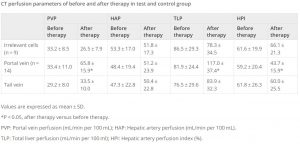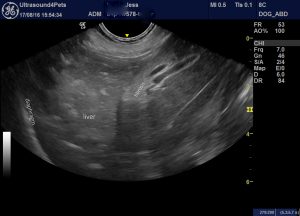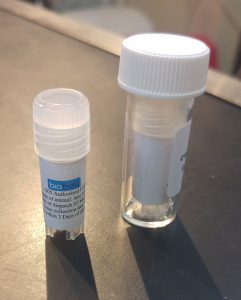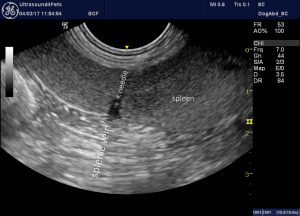Adipose-derived mesenchymal stem cells in the management of chronic hepatitis in Springer Spaniel
Chronic hepatitis in the English springer spaniel: clinical presentation, histological description and outcome.
Wang Y, Lian F, Li J, Fan W, Xu H, Yang X, Liang L, Chen W, Yang J.
J Transl Med. 2012 Jun 26;10:133
Adipose is a rich source of stem cells and can be harvested with minimal peri-operative morbidity. These authors compared tail vein and portal vein infusion of adipose-derived mesenchymal stem cells (ADMSCs) in rats with induced hepatopathy. At 12 weeks post treatment there were marked improvements in liver perfusion in the portal vein group despite continued administration of hepatotoxic CCl4:


sagittal midline view of the liver from below the xiphisterum
Safety and efficacy of allogeneic adipose tissue-derived mesenchymal stem cells for treatment of dogs with inflammatory bowel disease: Clinical and laboratory outcomes.

This is what 20,000,000 stem cells look like!
This week we administered 20,000,000 ADMSCs into her portal circulation via ultrasound-guided trans-splenic injection into a splenic vein.

The procedure was free from complications and we await developments…..






The latest update is that Jess remains well, as of Oct 2017, 7 months after her stem cell therapy. Fingers crossed.
Our 7 yr old springer Rupert (his father is an ESS, a field spaniel imported from uk) is asymptomatic for CH, his liver biopsy is bad (our vet described in laymans terms that 1/3 dead, 1/3 scar tissue and 1/3 inflammed) and he has high copper accumulation too. He has been on a rigid Cu free ‘hepatic’ diet for three months now, on several antibiotics, ursodial, denamarin, and apo-prednisone of varying doses, and now vit E. the prednisone has plateaued the ALT but two other markers have ibcreased two much. Our vet wants to make a gradual switch to cyclosporine. Ruperts liver has been poor for over a year and bad for 4 months. He has not had chelation therapy. Any suggestions what to do?? The cyclosporine will be $400 canadian per month.
Poor Rupert 🙁 Difficult to comment on specific cases but generally-speaking CH is problematic because very little good evidence on which to base treatment. A wide variety of drugs have been tried but, if you want to stick to the highest standards of proof, none of them have them have really convincing effect. Most medications have potential adverse effects as well as benefits obviously. That’s why we have tried stem cell therapy on some of our patients. At the very least it seems safe. All three treated dogs are currently alive and coping -that’s not exactly the highest standard of proof either I realise. Worth looking into if you can find a lab who will do the culture commercially.